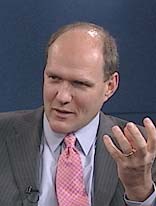 I found this clip by Stephen Walt interesting in which he notes the New America Foundation as one of the few islands in the policy establishment that believes we need a more restrained approach to America’s foreign policy commitments.
I found this clip by Stephen Walt interesting in which he notes the New America Foundation as one of the few islands in the policy establishment that believes we need a more restrained approach to America’s foreign policy commitments.
Here are the last grafs:
By the way, I won’t be offended if you toss in public policy programs like John Hopkins’ School for Advanced International Studies, Tuft’s Fletcher School of Law and Diplomacy, Princeton’s Woodrow Wilson School, or my own employer, the Harvard Kennedy School. These institutions are dedicated to various forms of social engineering at home and abroad, and to preparing students for careers of public service. I’m all for that, because there are in fact plenty of big problems out there and I’d rather they were addressed by people who were trained to do so. But no matter how well we train our students to weigh alternatives carefully, the raison d’etre of these programs reinforces the same message: don’t just sit there, DO SOMETHING!
By contrast, there are at most a handful of institutions whose core mission is to get the United States to take a slightly smaller role on the world stage. There is the CATO Institute (where Preble works) and maybe a few people at the Center for American Progress and the New America Foundation. And there are plenty of peace groups out there with an anti-interventionist agenda. But these groups are hardly a match for the array of forces on the other side. And apart from Steve Chapman at the Chicago Tribune, I can’t think of a major mainstream columnist or media commentator who is a consistent voice for a more restrained foreign policy. Lots of pundits want a smarter foreign policy (though they often disagree about what that would be), and most of them have a pet issue or two that they like to flog, but how many have been arguing for doing somewhat less as a general rule?
In short, what I’m suggesting here is that America’s role in the world today is shaped by two imbalances of power, not just one. The first is the gap between U.S. capabilities and everyone else’s, a situation that has some desirable features (especially for us) but one that also encourages the United States to do too much and allows others to do either too little or too many of the wrong things. The second imbalance is between organized interests whose core mission is constantly pushing the U.S. government to do more and in more places, and the far-weaker groups who think we might be better off showing a bit more restraint.
It is coincidental that I’m traveling with Stephen Chapman of the Chicago Tribune in China now — along with Bruce Stokes of National Journal and Tom Omestad of US News & World Report.
— Steve Clemons


8 comments on “A Restrained Foreign Policy”